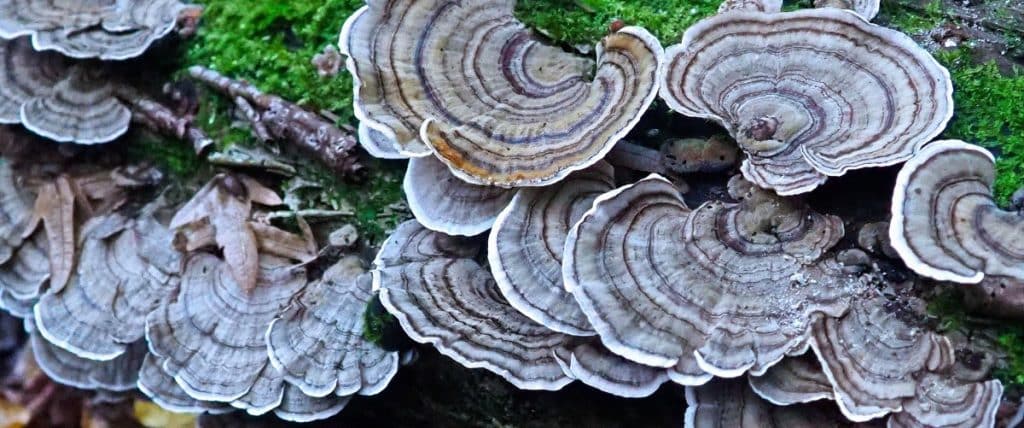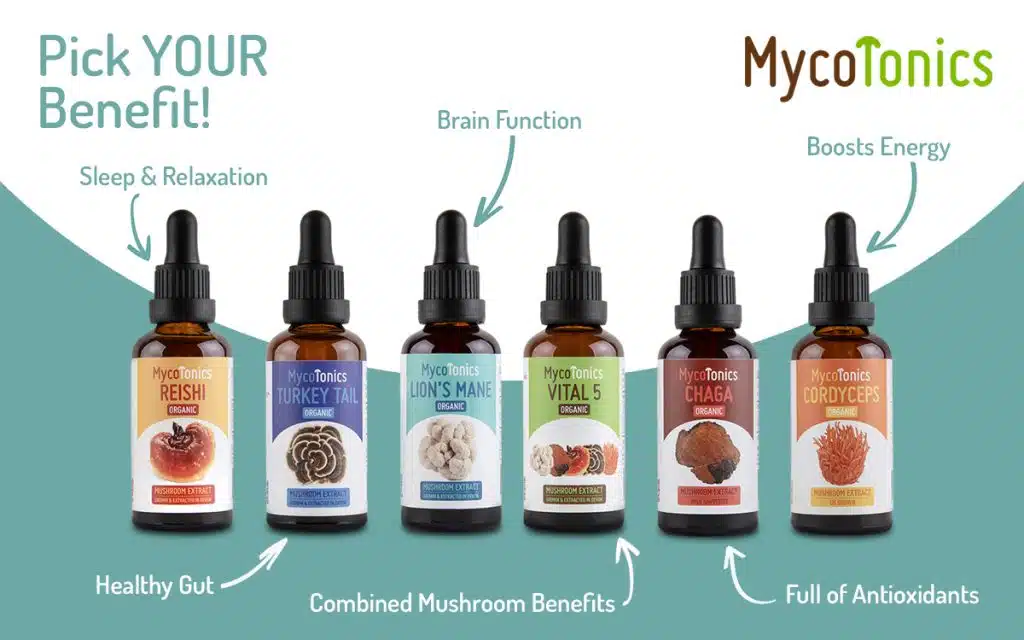Turkey tails are some of the most well-researched medicinal mushrooms, with a history of use dating back thousands of years.
Best known for strengthening the immune system, maintaining a healthy gut microbiome and helping fight some cancers, turkey tail mushrooms have a lot to offer.
They’re part of the polypore family and grow abundantly in clusters on dead trees, branches and stumps worldwide, making them one of the most common medicinal mushrooms found by foragers.
Read on to learn more about turkey tail mushroom health benefits, how to use them and what to look for when purchasing turkey tail mushroom supplements.
If you’re in the UK, I’d love you to check out our range of extracts called MycoTonics. It includes one made with the wonderful turkey tail mushroom.
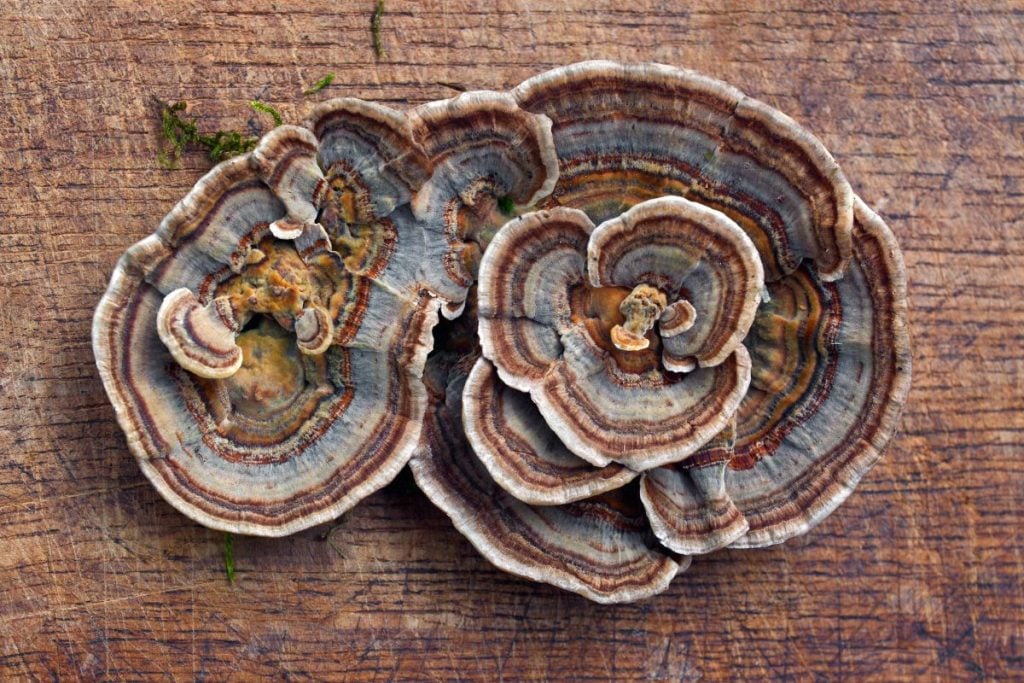
Turkey Tail Mushroom Health Benefits
Turkey tail mushrooms are nutrient-dense, functional foods that may provide a range of health benefits, including:
1. Boosting the Immune System
Turkey tail is best known for its protein-bound polysaccharides or polysaccharopeptides that enhance our immune system response by activating or inhibiting specific immune cells.
Two of the most impressive polysaccharopeptides in turkey tail mushrooms are Polysaccharide Krestin (PSK) and Polysaccharide Peptide (PSP).
Studies show that PSP has immunostimulatory effects on several types of immune cells, increasing their numbers and encouraging the production of beneficial cytokines that fight infection and boost immunity.
PSK regulates the body’s immune response by activating T and B lymphocytes or natural killer cells. These are specific white blood cells that help protect the body against pathogens and cancerous tumors.
Turkey tail mushroom extracts contain these compounds and provide potent immune-boosting effects that can counter immunosuppression, making them beneficial for patients undergoing chemotherapy.
2. Combating Cancer
Researchers have conducted many studies and clinical trials exploring the effects of turkey tail mushrooms on various types of cancer.
These show that turkey tail could not only inhibit the growth of certain cancers, but also counteract the effects tumors have on the body by boosting the immune system’s response to the tumors.
Japan and China have approved turkey tail mushrooms for use as supplementary cancer treatments to help improve symptoms and outcomes in patients with several types of cancer, including:
A review of turkey tail clinical trials found that cancer patients taking turkey tail alongside standard treatments lived longer than those who only received chemotherapy.
However, some cancers don’t respond as well to turkey tail mushroom supplements, and scientists need more information to determine the best way to use turkey tail mushroom extracts to fight cancer.
3. Aiding Gut Health
Studies suggest turkey tail mushrooms may play a role in gut health by acting as prebiotics and promoting the development of beneficial bacteria in the gut microbiome.
Turkey tail mushrooms contain PSP, a heteropolysaccharide resistant to human digestive enzymes that acts as a prebiotic.
A healthy, balanced gut microbiome is vital for overall health as it improves digestion, providing more energy and boosting the immune system.
A 2013 test-tube study found that turkey tail mushroom extract modified the gut microbiota’s composition by increasing beneficial bacteria, like Bifidobacterium and Lactobacillus, and reducing potentially harmful bacteria.
Another study, this time using 24 volunteers who consumed 3,600 mg of turkey tail PSP extract daily for eight weeks, supported these findings.
During this study, scientists found that PSP from turkey tail mushrooms can create distinctive changes in the human gut microbiome consistent with its activity as a prebiotic.
4. Supporting Liver Health
The PSP in turkey tail mushrooms is remarkable and, as mentioned above, has the potential to boost the immune system and improve gut health, but that’s not all.
Research suggests that PSP also helps protect the liver by reducing oxidative stress, modulating immunity and slowing the accumulation of fat on the liver.
Heavy use of alcohol, more than the liver can process effectively, damages the liver and causes alcoholic liver disease (ALD) that can lead to chronic liver diseases and mortality.
In studies conducted on mice in 2017 and 2018, scientists found that PSP had hepatoprotective effects and the potential to be a functional food for protecting against alcoholic liver disease.
Historically, Chinese healers used turkey tail mushrooms to help with liver disorders like jaundice.
5. Improving Athletic Performance
Animal studies suggest turkey tail supplements could boost athletic performance and reduce fatigue, but we need more human trials to confirm these findings.
In a 2017 study exploring the effects of turkey tail extract on exercise performance and physical fatigue in mice, results showed it has the potential to improve exercise performance and reduce fatigue.
During this study, mice taking turkey tail extract for 4 weeks showed increased endurance and strength, reduced physical fatigue and lower blood sugar levels at rest and after exercise.
6. Reducing Inflammation
Our bodies produce unstable molecules, like free radicals, daily during normal cellular metabolism.
Free radicals are also produced in response to stress and exposure to toxic substances like cigarette smoke, industrial chemicals and air pollutants.
There is a delicate balance in our bodies between free radicals and antioxidants, and when circumstances create too many free radicals, it causes oxidative stress and inflammation.
Avoiding oxidative stress and supporting a healthy inflammatory response are crucial for maintaining a healthy body, especially as you age.
Fortunately, consuming antioxidant-rich foods or supplements can help to reduce oxidative stress and inflammation, and turkey tail is ideal as it contains numerous antioxidants.
In fact, a 2017 study exploring the chemical composition of turkey tail detected 38 phenolic compounds, including the flavonoids baicalein and quercetin, which are potent antioxidants.
Quercetin, for example, helps to reduce inflammation and boost immunity by promoting the production of protective proteins and inhibiting the release of pro-inflammatory enzymes.
The study found that turkey tail water extract has considerable potential for use as a natural source of antioxidants.
In another recent study, turkey tail extract showed effective anti-inflammatory activity, suggesting potential for future use as an active ingredient in anti-inflammatory drugs.
7. Improving Skin Health
Turkey tail mushrooms’ skin benefits are an added bonus and a direct result of the other health benefits discussed above.
For example, a well-functioning gut helps your body absorb all the nutrients necessary for healthy glowing skin, and turkey tail’s anti-inflammatory properties also aid skin health.
The antioxidants in turkey tail mushrooms help by reducing oxidative stress that damages proteins like collagen and elastin, causing wrinkles.
Turkey tail also contains quercetin that, according to a recent human study, offers several skin benefits, including:
-
- Protecting against damage by UV radiation or contact with toxic chemical compounds.
-
- Providing anti-allergic properties that help reduce redness, itching, and inflammation.
-
- Helping to restore skin barrier function, thereby increasing hydration and reducing water loss.
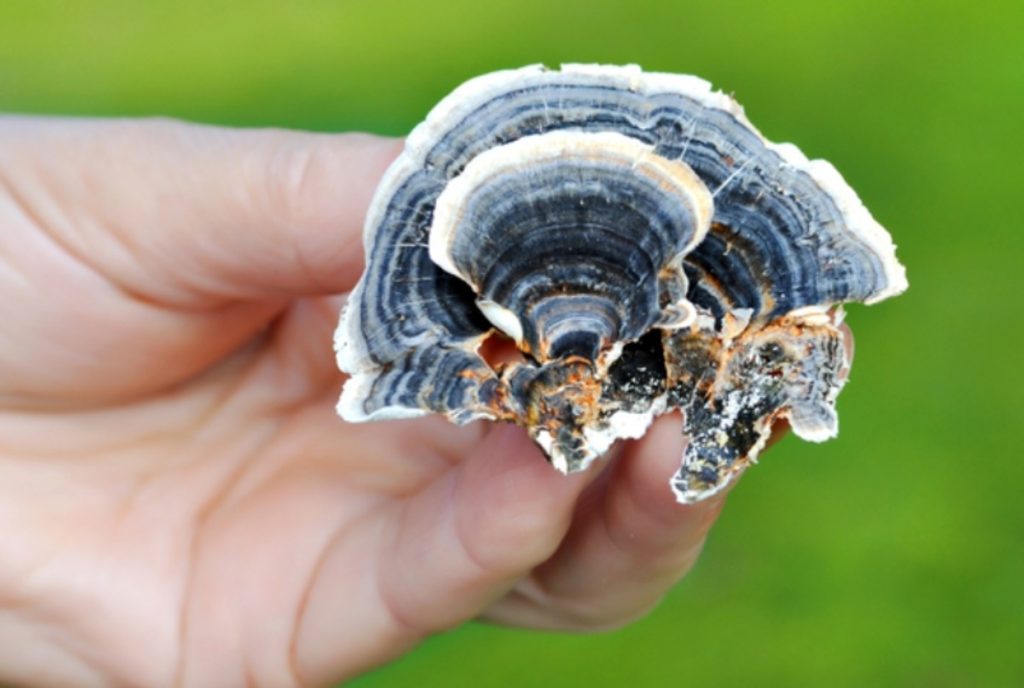
Risks and Side Effects of Consuming Turkey Tail Mushrooms
Turkey tail mushrooms are one of the most studied medicinal mushrooms and are generally considered safe for consumption for extended periods.
Most people consume turkey tail mushrooms as supplements or tea, and they’re well tolerated with few reported side effects, even when taken in high doses.
However, some people have reported side effects to turkey tail mushrooms, including:
-
- Gastrointestinal issues like bloating, gas, stomach pain, diarrhea and nausea
-
- Cold and flu symptoms
-
- Low blood pressure
-
- Low blood sugar
-
- Heart palpitations
-
- Skin rashes
-
- Heartburn
-
- Darkened fingernail pigmentation
-
- Dark stools
Is Turkey Tail Mushroom Bad for Your Liver?
No, turkey tail mushrooms are not bad for your liver, and as mentioned above, the compounds in turkey tail mushrooms support a healthy liver.
The perception that they may be bad for your liver comes from the fact that some chemotherapy patients, using a combination of chemotherapy and PSK extract for treatment, have reported liver problems.
However, researchers don’t know whether this side effect results from the chemotherapy or the PSK extract.
Who Shouldn’t Take Turkey Tail Mushrooms?
Although most people enjoy the benefits of turkey tail mushrooms without any side effects, turkey tail mushrooms are not recommended for use during pregnancy or breastfeeding.
And, if you’re taking medications or have underlying health conditions, it’s crucial to consult your doctor before adding turkey tails to your diet as it may interact with certain medications, impacting their effectiveness.
Consult your doctor if you have any of the following conditions:
Mushroom Allergies
If you’re allergic to mushrooms, mold or any of the compounds in turkey tail mushrooms, you may experience an allergic reaction after taking turkey tail. Symptoms could include a swollen throat, trouble breathing or skin rashes.
If you show any of these symptoms after eating turkey tail mushrooms, consult your doctor immediately.
Diabetes
Like many other medicinal mushrooms, turkey tail mushrooms may significantly reduce blood sugar levels and improve insulin resistance.
If you’re on diabetes medication, the addition of turkey tail mushrooms could cause your blood sugar to drop too low.
A Bleeding Disorder
If you suffer from a blood clotting disorder and are taking blood-thinning medications like Warfarin or Aspirin, consult your doctor before taking turkey tail supplements.
Turkey tail mushrooms have blood-thinning properties, and combining them with blood-thinning medications could slow blood clotting to dangerous levels.
An Autoimmune Condition
Turkey tail’s immune-boosting properties might interfere with immunosuppressant medications, often prescribed after organ or stem cell transplants or for autoimmune conditions and cancer.
If you’re on immunosuppressants, consult your doctor before adding turkey tails to your diet, as, like most foods or supplements, they can alter the immunosuppressant levels in your blood.
Cancer
Although some countries have approved turkey tail mushrooms for use as part of a cancer treatment program, they may interact with certain drugs.
Studies show that PSP may enhance the effectiveness of Cyclophosphamide, a medication used for chemotherapy and to suppress the immune system.
Thus, the use of turkey tail supplements during cancer treatment should always be under the supervision of an oncologist so they can adjust dosages accordingly.
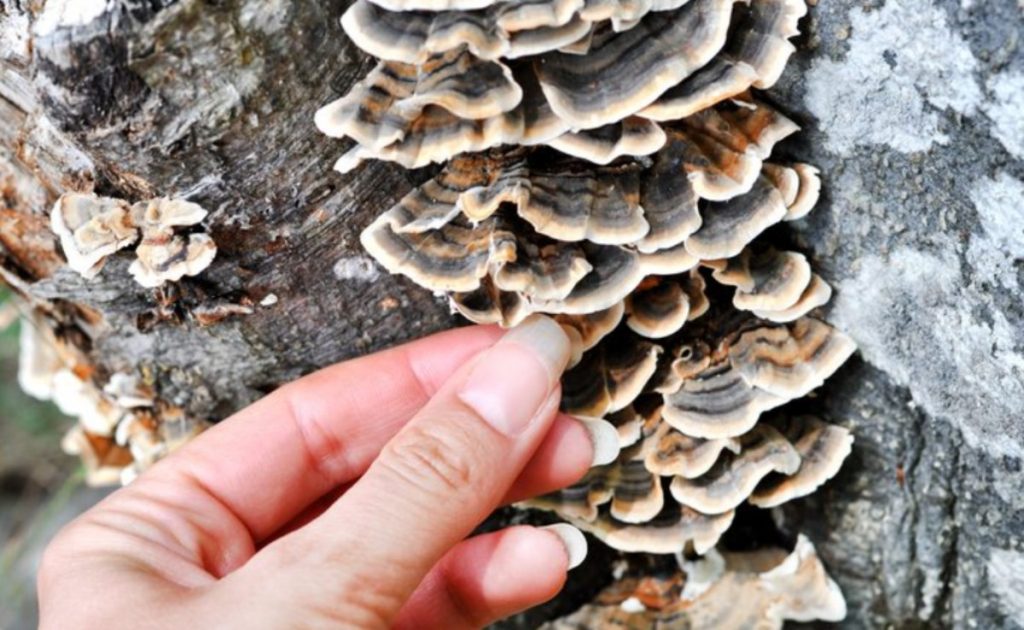
How to Use Turkey Tail Mushroom
Although turkey tail mushrooms are edible, they’re tough and woody, and eating them is like chewing on tree bark or cardboard.
As a result, turkey tail is usually dried and chopped into pieces to make tea or ground into a powder.
You can take turkey tail powder in capsule form or use it to make tea, and if you’re not crazy about the taste, you can add turkey tail mushroom powder to smoothies, oatmeal, soups or salad dressings.
Historically, people consumed turkey tail as a tea. This was effective as most of the beneficial compounds in turkey tail are water soluble, and boiling dried turkey tail to make tea releases more of these compounds.
Is Turkey Tail a Superfood?
The word superfood is a marketing term used to describe nutrient-rich foods that people consider especially beneficial for a person’s health and well-being.
Turkey tail mushrooms fit this description as they contain numerous beneficial compounds, including essential minerals, vitamins, antioxidants and dietary fiber, and people often refer to them as a superfood.
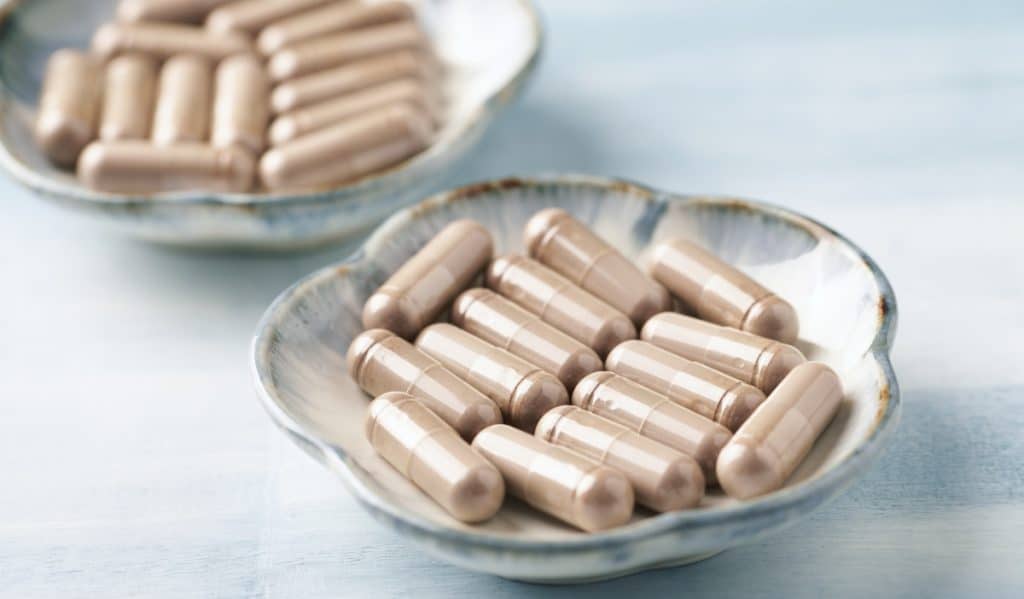
Types of Turkey Tail Mushroom Supplements
As the popularity of turkey tail mushrooms increases, manufacturers have created a range of supplements to suit various preferences and lifestyles.
These supplements come in various forms, including capsules, powders, and tinctures, and understanding the different types can help you choose the right supplement for your needs.
Before we look at the different forms, it’s beneficial to understand the difference between supplements containing powdered turkey tail and those made using turkey tail extracts.
Some producers make turkey tail supplements using dried and powdered mushrooms. Others use mushrooms and mycelium dried and ground into a powder together.
Supplements made from dried and powdered turkey tail are less potent than those containing turkey tail extracts as the extraction process makes more active compounds available.
Turkey tail extracts usually come in the form of tinctures or powders. To create these powders, liquid turkey tail extract is freeze-dried and then powdered.
You’ll find turkey tail mushrooms for sale in the following forms:
-
- Capsules – Ideal for those who prefer a straightforward and measured approach to supplementation, capsules provide a convenient way to incorporate turkey tail into your daily routine.
- Capsules – Ideal for those who prefer a straightforward and measured approach to supplementation, capsules provide a convenient way to incorporate turkey tail into your daily routine.
-
- Powders – Turkey tail mushroom powders are versatile and can be easily added to smoothies, beverages, or food. This form of turkey tail allows for creative and personalized ways to enjoy their benefits.
- Powders – Turkey tail mushroom powders are versatile and can be easily added to smoothies, beverages, or food. This form of turkey tail allows for creative and personalized ways to enjoy their benefits.
-
- Tinctures – Mushroom tinctures are concentrated liquid extracts that offer a convenient and quick way to absorb turkey tail’s beneficial compounds and are ideal for people who prefer liquids to capsules or powders.
- Tinctures – Mushroom tinctures are concentrated liquid extracts that offer a convenient and quick way to absorb turkey tail’s beneficial compounds and are ideal for people who prefer liquids to capsules or powders.
-
- Combination Formulas – Some supplements blend turkey tail with other medicinal mushrooms or immune-supporting ingredients, creating comprehensive formulas. These combinations cater to specific health goals and may enhance the overall benefits.
- Combination Formulas – Some supplements blend turkey tail with other medicinal mushrooms or immune-supporting ingredients, creating comprehensive formulas. These combinations cater to specific health goals and may enhance the overall benefits.
-
- Dried Mushrooms – Whole, dried turkey tail mushrooms are also available for those who enjoy a more traditional approach. You can infuse these into teas or broths, providing a simple but potent way to access their benefits.
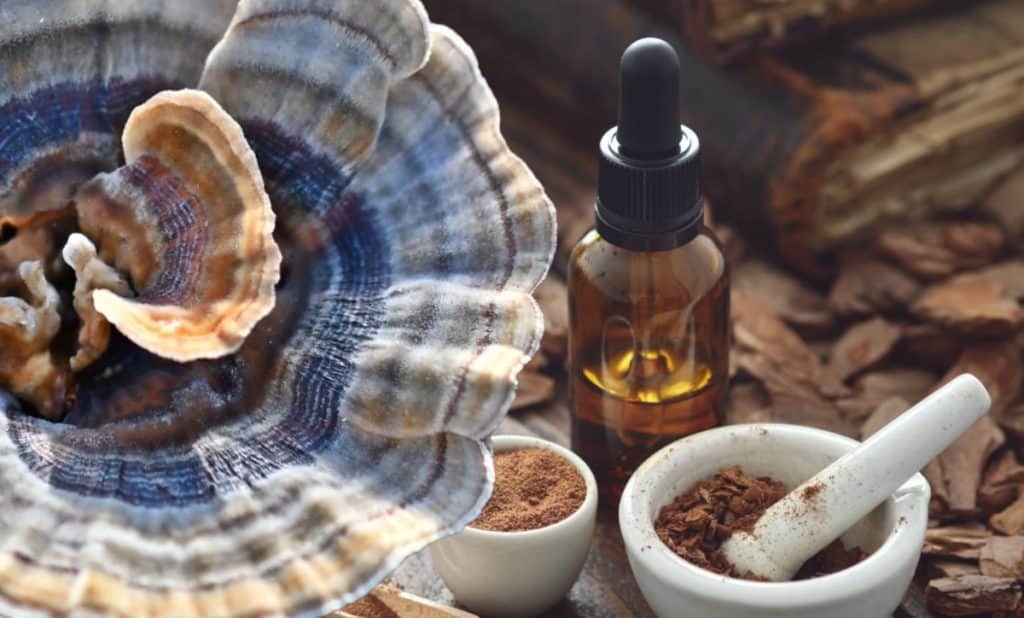
What to Look for When Buying Turkey Tail Mushroom Supplements
When choosing a turkey tail supplement, factors such as personal preference, lifestyle, and ease of use play a role.
Choosing the right product involves considering several factors to ensure you receive maximum benefits. Here’s a guide on what to look for when buying turkey tail mushroom supplements:
Quality of the Mushrooms
Choose supplements made with high-quality, organic turkey tail mushrooms. Mushrooms absorb nutrients from their environment, so choosing products made with mushrooms from a reputable source ensures a clean and potent product.
Part of the Mushroom Used
Some supplements contain turkey tail mushroom mycelium instead of the fruiting body, and, as it’s challenging to extract mycelium from the grain substrate it’s grown in, the end product usually contains grain.
This is not ideal, as grain is a filler that dilutes the amount of healthy compounds in the supplement.
To ensure the best turkey tail mushroom supplement possible, look for one made with 100% turkey tail mushroom and no mycelium or grain.
Extraction Method Used
The extraction method used plays a significant role in the concentration of beneficial compounds in a supplement.
Look for turkey tail supplements made using hot water or dual extraction methods to get a broad spectrum of bioactive compounds.
There’s a lot of debate about the best method of mushroom extraction for maximum benefits, water, alcohol or both, and each method has its place.
However, the beneficial protein-bound polysaccharides in turkey tail mushrooms are water-soluble, and turkey tails don’t contain many notable alcohol-soluble compounds.
So, if you want to get the best turkey tail mushroom extract possible, confirm the producer used hot water extraction when making it.
Beta-Glucan Content
Beta-glucans are the immune-supporting polysaccharides found in turkey tail mushrooms. Check the product’s beta-glucan content, as this indicates its potential effectiveness. Reputable brands often provide this information on their labels.
Use of Additives and Fillers
Inspect the supplement’s ingredient list for unnecessary additives, fillers, binders or preservatives.
The best supplements are those that contain 100% pure turkey tail mushroom or extract, as unnecessary additives often reduce the strength of the supplement.
Third-Party Testing
Choose supplements that undergo third-party testing for quality and purity. This ensures that the product is free from contaminants and meets the dosage levels claimed on the label.
Reputation of the Brand
Always buy supplements from reputable suppliers with a history of transparency, quality organic products, and positive customer reviews, and, if possible, support smaller local producers.
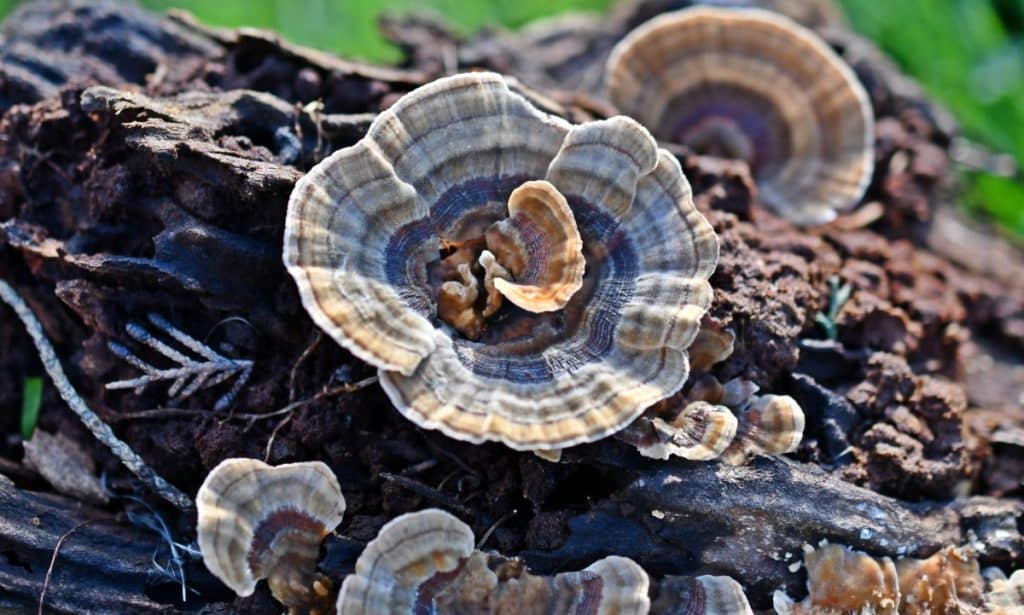
Turkey Tail Mushroom Dosage
Like other medicinal mushrooms, there is no official recommended dosage for turkey tail, and the amount you need to take will vary depending on the type of supplement you’re taking.
Generally, if you’re taking 100% powdered turkey tail mushrooms from a reputable supplier, a safe yet effective daily dose is 2000 to 2500 mg (2 to 2.5 grams).
But, depending on the desired outcome, you may need a much larger dose, and clinical trials on cancer patients have used daily doses of between 3 and 9 grams safely.
When trying a turkey tail supplement for the first time, we recommend following the dosage instructions on the product label.
Is it safe to take turkey tail mushrooms every day?
Yes, it is safe to take turkey tail every day, and, like most medicinal mushrooms, you need a regular daily dose to enjoy all the benefits this mushroom offers.
How fast does turkey tail work?
Turkey tail mushrooms’ health benefits are a direct result of their potent antioxidants and polysaccharides that help combat oxidative stress, regulate the gut microbiome and reduce inflammation.
These benefits are not felt immediately but rather compound over time, and when you first add turkey tail to your diet, it can take up to 3 weeks to experience noticeable benefits.
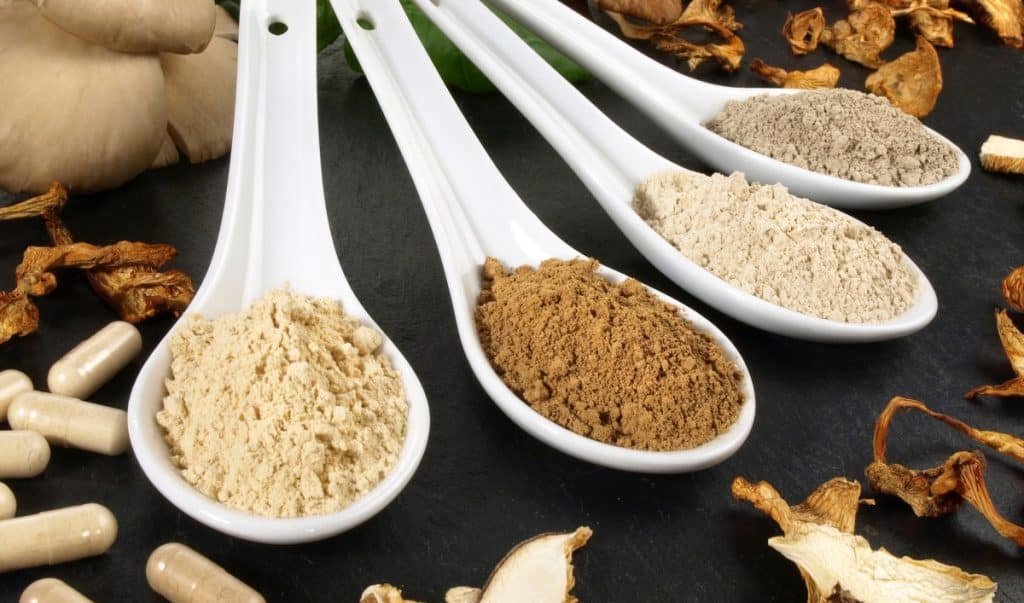
History of the Medicinal Use of Turkey Tail Mushrooms
The use of turkey tail mushrooms for their medicinal properties in Europe, Asia, and among native tribes of the Americas dates back thousands of years.
Prized for their immune-boosting properties, ancient healers believed these mushrooms brought balance to the body and promoted vitality.
Its use was first documented in a written text from the Han Dynasty, Shennong Ben Cao Jing, around 200 BC.
And, in the Compendium of Materia Medica (Ben Cao Gang Mu) from the Ming Dynasty in the 15th century, turkey tail tea is said to be beneficial for the spirit and vital energy and promote strong bones and tendons.
In traditional Chinese medicine, turkey tail mushrooms are called Tun Zhi and are often used to support respiratory health and fortify the body’s defenses.
Native American tribes also embraced the healing potential of turkey tail mushrooms and often used them in holistic remedies to bring harmony to the mind, body, and spirit.
They believed the bands of color on turkey tail mushrooms represented the interconnectedness of nature’s elements.
Since the 1960s, medical practitioners in Japan and China have used turkey tail extracts as part of the treatment program for various types of cancer, and, as a result, it’s one of the most researched medicinal mushrooms.
Final Thoughts
Turkey tail mushrooms contain loads of beneficial compounds that have the potential to boost your immune system, reduce inflammation, enhance athletic performance and protect the liver.
Historically, people consumed them as tea, but as they’ve grown in popularity, the options have increased, and you’ll find turkey tail supplements in the form of tinctures, powders and capsules.
Not all supplements are equal, so always buy your turkey tail from a reputable supplier and check the ingredients list carefully.
Alternatively, you could source turkey tail mushrooms, dry them, and make homemade tea, powders or extracts.
Although you can find turkey tails in the wild almost anywhere, they absorb pollutants from the environment around them, and depending on where you live, it may be better to grow your own.
Turkey tails are relatively easy to grow, but slow, and it can take up to 60 days from pinning to point of harvest. You can grow them indoors using hardwood sawdust for substrate or outdoors on logs.
To learn more about growing mushrooms the low-tech way, visit our Mushroom Growing Hub or sign up for one of our mushroom cultivation courses.
